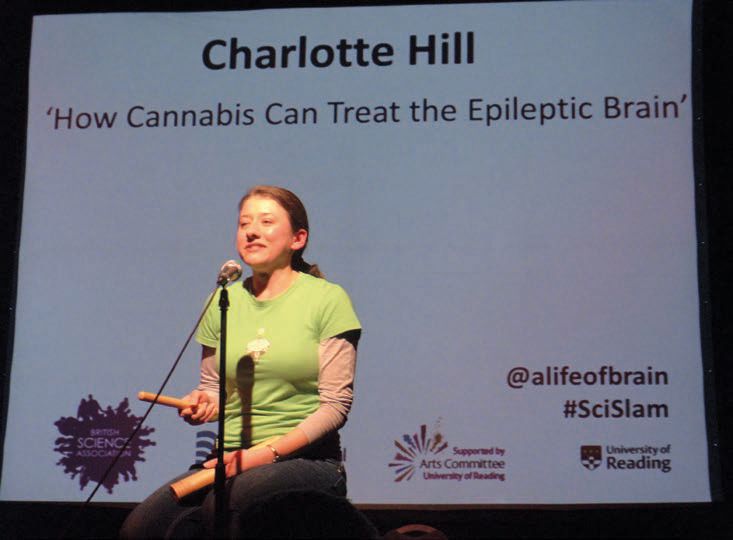
Physiology News Magazine
PhySoc Outreach Grant: Reading Science Slam
News and Views
PhySoc Outreach Grant: Reading Science Slam
News and Views
Gary Stephens & Alister McNeish
University of Reading, UK
https://doi.org/10.36866/pn.95.6
A Physiological Society Outreach Grant helped to set up a gladiatorial battle between five young postgraduate scientists (Slammers) and one Faculty Outreach Facilitator (!) from the University of Reading on 22 March 2014. The inaugural Reading Science Slam played out in front of a 125-strong, sell-out public audience at Reading’s South Street Arts Centre. The event was held together by the stern hand of local Physiological Society representative, Gary Stephens; there were no rules! Well, there were some rules:
• MUST be fun
• MUST be theatrical AND creative AND scientific
• MUST NOT use PowerPoint (it’s not a lecture!)
• MUST NOT exceed 6 mins – the bell must be obeyed!
Ben Littlefield (a Faculty Outreach Facilitator) showed the Slammers how it was done, detailing the life of the unfortunate chemist, Carl Wilhelm Scheele, with added pyrotechnics, and teaching us to always use our senses in science. Ioannis Zoulias from the Department of Systems Engineering gave an impassioned talk entitled ‘Senses and the Brain – How Do We Recognise Our Body?’. Who could top this energetic enthusiasm (and failure to remember the names of his volunteers)? Step forward Charlotte Hill from the Reading School of Pharmacy, a true (electro)physiologist, delivering ‘How Cannabis Can Treat the Epileptic Brain’ with only a couple of sticks as props. Charlotte had the audience under her control, instructing them how to behave like pyramidal neurones and their dominant inhibitory neighbours, the interneurons; luckily no drinks were spilled… Natalie Masento from Psychology presented ‘The Hydration Exploration’, asking how avoiding dehydration can increase our cognitive function. Natalie, a mild-mannered, forgetful PhD student by day, was transformed into ‘Water Woman’ once she got some water inside her, replete with increased cognitive powers and able to spot someone tweeting in the audience from a mile off!

The final two Slammers provided a change from life sciences. Meterology’s Melody Sandells explained how size matters – for snowflakes, helping predict global snow cover and ice melt – with the use of ice, hammers and a blender. Mel battled the toll of the bell to finish her presentation. The final slammer was Emily Sonnex from Chemistry, who gave an expert demonstration of ‘Chemistry in the Fight Against Crime’, by revealing how to detect a fraudulent bank note. This required willing participants from the audience to do impressions of vibrating particles and their absorption spectra – the only question is – will Alister McNeish ever get his £20 note back?
Dr Stephens then explained the empirical, scientific voting system and, after a quick count, the scores were in. And the winner was Charlotte Hill, a Physiological Society Member no less, a well-deserved victory explaining a complex problem in a simple and enjoyable way. The public left happy; none of this could have happened without the support of The Physiological Society – we expect this event to run for many years to come! See the videos at www.youtube.com/channel/UCPGv40B6QqHcwmvrReHJxlQ

